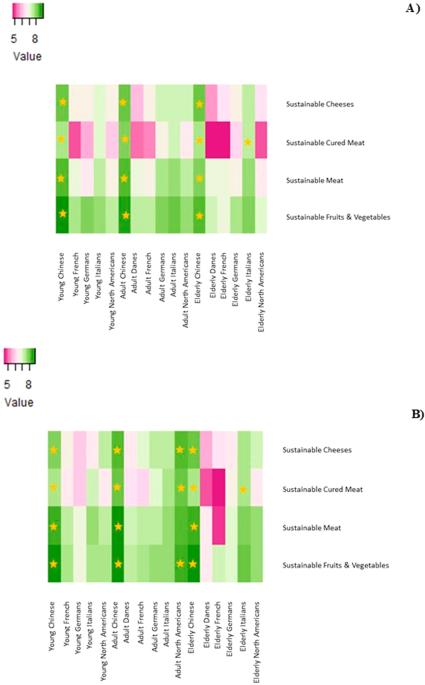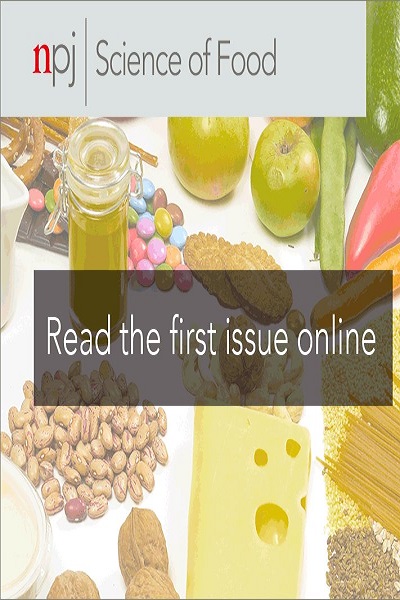关注可持续认证和食品消费变化的社会人口和国家间差异。
IF 6.3
1区 农林科学
Q1 FOOD SCIENCE & TECHNOLOGY
引用次数: 0
摘要
食品标签可以影响,有时甚至促进消费者饮食结构的改变,以支持环境的可持续发展和应对气候变化。然而,消费者倾向于低估其食品选择对环境的影响以及对可持续认证的了解有限,可能会严重阻碍这种饮食习惯的转变。这些方面都受到个人特征和地域归属的影响。在此背景下,本研究旨在通过比较不同的食品和国家(意大利、法国、德国、丹麦、美国和中国),找出促使消费者购买食品的频率以及与消费者对气候变化的关注和对可持续食品认证的兴趣相关的食品消费变化的主要因素。我们对 6500 名不同食品的消费者进行了跨国调查。然后,利用广义线性混合效应模型对所获得的平均分数进行比较,以评估消费者的食品购买频率、可持续认证的重要性以及因气候变化而导致的食品消费变化之间的关联。研究发现,消费者在食品消费、购买行为和对可持续认证的兴趣方面的大部分差异取决于年龄、性别和原产国等因素。事实上,中国消费者对可持续食品认证表现出更大的兴趣,但他们对所有食品的总体消费得分却更高。相反,丹麦的成年和老年消费者对奶酪、肉类、水果和蔬菜的消费量有所下降,他们对所有可持续食品认证的兴趣得分也较低。尽管不同消费者的兴趣和食品消费模式的微小变化带来了挑战,但我们的研究结果表明,可持续认证为促进采用可持续饮食和应对气候变化的直接干预措施提供了一个前景广阔的途径。本文章由计算机程序翻译,如有差异,请以英文原文为准。

Socio-demographic and cross-country differences in attention to sustainable certifications and changes in food consumption
Food labeling can influence, sometimes facilitate, changes in consumer diets to support environmental sustainability and in response to climate change. However, a significant impediment to this dietary shift may arise from the consumers’ tendency to underestimate the environmental impact of their food choices and from their limited knowledge about sustainable certifications. These aspects are influenced by the characteristics and geographical affiliations of individuals. In such a context, the aim of this research has been to identify the main factors that drive the food purchasing frequency and the changes in food consumption associated with consumers’ concerns about climate change and interest in sustainable food certifications by comparing different food products and countries (Italy, France, Germany, Denmark, the USA, and China). A cross-country survey was conducted on 6500 consumers of various food products. The obtained mean scores were then compared, using generalized linear mixed-effect models, to evaluate the associations between the consumers’ food purchasing frequency, the importance of sustainable certifications, and changes in food consumption due to climate change concerns. Much of the variation in food consumption, purchasing behaviors, and interest in sustainable certifications was found to depend on such factors as age, gender, and country of origin. Indeed, Chinese consumers exhibited a heightened interest in sustainable food certifications, yet their consumption scores for all food products overall were higher. Conversely, adult and elderly Danish consumers demonstrated a decrease in the consumption of cheeses, meat, fruits, and vegetables, and their interest scores in all sustainable food certifications were lower. Despite the challenges posed by various consumers’ interests and minimal changes in food consumption patterns, our findings suggest that sustainable certifications present a promising avenue for straightforward interventions to promote the adoption of sustainable diets and to address climate change.
求助全文
通过发布文献求助,成功后即可免费获取论文全文。
去求助
来源期刊

NPJ Science of Food
FOOD SCIENCE & TECHNOLOGY-
CiteScore
7.50
自引率
1.60%
发文量
53
期刊介绍:
npj Science of Food is an online-only and open access journal publishes high-quality, high-impact papers related to food safety, security, integrated production, processing and packaging, the changes and interactions of food components, and the influence on health and wellness properties of food. The journal will support fundamental studies that advance the science of food beyond the classic focus on processing, thereby addressing basic inquiries around food from the public and industry. It will also support research that might result in innovation of technologies and products that are public-friendly while promoting the United Nations sustainable development goals.
 求助内容:
求助内容: 应助结果提醒方式:
应助结果提醒方式:


